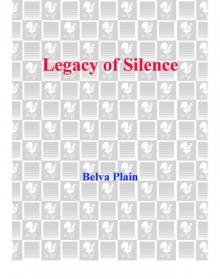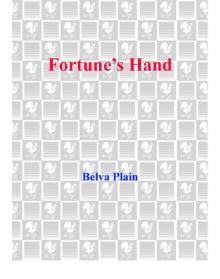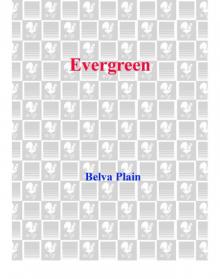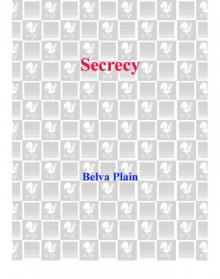- Home
- Belva Plain
Harvest Page 5
Harvest Read online
Page 5
He felt slight irritation at the second admonition of the day. “Am I to marry every lovely woman who comes along?”
“Don’t be silly. You’ve been—going about with her—for ages.” Meg laughed. “Yes. Did you think West Eightieth Street was a secret?”
Paul felt himself blushing like a boy. “What on earth—”
“Oh, all right, I’ll tell you. We’ve got some friends who met you once at our house and who happen to live across the hall from Ilse. They’ve seen you coming and going for years. You’re a person people remember, you know. And that’s the story,” she concluded, still half laughing.
Paul had to laugh too. “And I thought we were so well hidden. Such a tight secret.”
“You thought I wouldn’t approve? That’s why you never told me?” Meg was slightly reproachful.
That was just what he had thought, but he merely shrugged.
“Well, there’s Marian, and—”
“Everybody in the family knows that Marian’s been sick for ages. And now—goodness knows, I don’t wish for her death, yet maybe it would be kinder in the circumstances to wish for it—but when it happens, I think you deserve someone wonderful for the first time in your life, someone just right for you.”
Not for the first time, he thought, but was touched nevertheless and replied simply, “Thank you, dear Meg.”
From the hall came sounds of impending departure. Meg looked at her watch.
“Goodness, we ought to be starting home! It’s been a beautiful holiday, Paul.” She kissed him. “And remember, when the time comes, you and Ilse must be married, and I want to be at the wedding.”
“No doubt we will be,” he said.
“You made an impression,” Paul told Ilse when everyone had left. “Everybody wants to make sure that we’ll eventually get married.”
“Who is ‘everybody’?”
“Well, to be exact, Meg and Agnes.”
“Darling, that’s wonderful, but it’s not what they think, it’s what we think.”
“There’s no question about what we think.”
“Marriage won’t make any difference in the way we feel.”
“No, but I’ll be glad when we can make it official. It does make a difference once you go out into the world beyond your own walls. I’d like everybody to know—ah, well, you understand what I mean.”
“I understand.”
Paul poured two brandies and they sat down on the sofa to talk about the party. He reflected that this was what well-married couples did after a social evening.
“They were all very nice people,” Ilse said. “You were right about Meg. She’s wholesome and kind. I can see why you love her.”
“She’s been like a sister to me.”
“You never let me meet her before.”
“Maybe it was foolish of me. I just didn’t think it right while Marian and I were living together, or I should say, occupying the same house. But you know, Meg guessed. She’d known it all the time, anyway.”
Ilse laughed, and Paul added, “I’ll take you there for Christmas. Meg and Larry make a real country Christmas. It’s like something out of Dickens.”
“Tell me about who was Jewish in her family.”
“Meg’s father, my Uncle Alfie. He took off his Jewish coat when he married Emily and tried to wear an Episcopalian one, but it didn’t quite fit. However, that was his business, not mine. He was a kind man, and I was fond of him. I miss him. I miss that whole generation.” He stared at the glass, tipping the amber liquid as if in its depths faces long gone might be reflected. “Meg’s had a hard life—not like yours, but hard in its way. Her first husband, Donal Powers, was a millionaire many times over, a real estate tycoon who got his seed money running rum during Prohibition. On the surface he was a polished gentleman, but underneath he was a killer. He made a second fortune with investments in Nazi Germany, then knew enough to get out in time. In short, he was a bastard. I don’t like to speak ill of the dead, but the truth is the truth.” He paused. Ugly memories fled through his mind. “Everything blew up one night at Leah’s house. It was Uncle Dan’s seventieth birthday, 1938, a few days after Kristallnacht. And Donal Powers sat there among us, all of us terrified and grieving, and he said, he actually said, that we’d all better make our peace with Hitler because he was going to win. Oh, and that anyway, Hitler had restored order to his country and must be given credit for that. He said it was unfortunate that some innocents had suffered, but that was inevitable whenever great changes took place. ‘Unfortunate’! God, he made a shambles of that evening, I can tell you. I never came so close to striking a man as I did then. It was Meg’s last straw too. She left him the next day. Took the five children and left. She should have done it long before. Am I boring you?”
“No. Tell me the rest.”
“After the divorce she went to veterinary school, met Larry, and married him. And they’ve been perfect for each other. Incidentally, she never took a penny from Donal, even when she needed it for her tuition. She didn’t have a cent of her own.”
“I’ll bet I know who gave her the money for the tuition.”
“Well, so I did. What’s money for, but to use it where and when it’s needed?”
“Oh, I like you, Paul! Have I ever told you I like you very much?”
“I don’t remember. Tell me again, please.”
“I like you, Paul. You are the best—so good, so smart and wise, and it’s extra nice that you’re handsome besides, a real bonus. Also, you buy me diamonds.”
This was a private joke, because Ilse had been awkward about accepting the diamond earrings, so that he’d had to argue her into taking them. She was wearing them now, and they made two very becoming sparks against her pepper-and-salt hair, which was also becoming.
“Tell me about the pale one, the artist. She’s tender under the prickly manner, I think. Very tender. I had a sense that she’s a lesbian. Is she?”
“Quite possibly.” Paul reflected, “Donal never cared about her. She was too arty for him. So naturally she had no love for him either. And for another thing, she knew where his money came from.”
“I don’t think that bothered Lucy too much. She’s a man-eater, isn’t she?”
This was a game Paul enjoyed, gauging the accuracy of Ilse’s perceptions, which were usually correct. He laughed.
“You have to admit she’s stunning. A lot of men wouldn’t mind being devoured by her.”
“No question about that. And Timothy,” Ilse went on, “he’s different again. Doesn’t he look like a prophet with that beard? A prophet in a biblical desert.”
“Yes, I’ve always found him the most interesting of the lot. He’s got a brother who works in the State Department, the Foreign Service, a real brain, too, and nice enough, but a little stiff and set on himself. Tim’s much more likable. He must be a splendid teacher, very open-minded, uncluttered, unfettered.” And, pursuing his subject, Paul added, “You know, he made over his share of their father’s estate to Agnes. He wanted no part of it. She didn’t want it, either, but he felt that an unmarried woman, an artist with an unreliable income, should have security, and he made her accept. It bothered Meg a good deal, and I daresay it was foolish of Tim, but still I have to admire him for standing by his principles. He saw it as dirty money. Besides, he doesn’t believe people should inherit things, anyway. So you see,” he finished, “Meg has complicated children.”
Ilse stood up and went to the window, looking out into the darkness. After a moment she said, “Just having children is complicated.” Her tone made a small, plangent echo in the room, and Paul knew she was remembering her own son, whose death had been somewhat “complicated.”
A moment later she forced brightness. “If I shot an arrow straight across the park from here, I’d just about hit my apartment.” She turned around to face him. “I can’t believe how long I’ve been there. Fourteen years!”
“You should have moved long ago. I’ve always told you it’s much too s
mall and cramped for you.”
“But this place of yours! I had no idea an apartment could be as gigantic as this. It’s intimidating.”
“One gets used to it.” And he thought, When the time comes, she will.
She moved to the mantel and examined a pair of birds. They were of Chinese enamel, the color of a blue jay’s wing.
“These are pretty, Paul.”
“They’re very old. Yuan dynasty.”
“I didn’t know. And these? They’re jade, aren’t they?”
In a small hanging cabinet stood a collection of jade figurines, moss-green and cream and pink.
“Do you like them?”
“Oh, yes! They’re beautiful. Dust collectors too.”
He was amused. For some reason this aspect of an otherwise appreciative woman pleased him. Probably it was because she was so unlike himself in this respect. She had no collector’s instinct at all.
“If it were up to me, Paul, I would have a wonderful soft feather bed, chairs, a desk, a table, bookshelves, and nothing more. Except paper plates,” she added.
“Sounds like a kibbutz in Israel.”
“Oh, I know a lot of people say they could live like that when they really couldn’t.”
“I believe you could,” Paul told her.
“But you couldn’t.”
“You’re absolutely right. I don’t want to live in Israel on a kibbutz or anywhere else. I know how to raise funds for them, though,” he finished somewhat defiantly.
“Darling, I know that. And I know you’ve done far more than you’ll admit to doing.”
That was true. After all this time there were still some things he never talked about to anyone. He thought of those black days in 1948 right after the state was founded, when within hours, the Arabs had attacked it from all sides; the need for arms had been so desperate and immediate that the means for getting them overseas were at that moment unimportant, even if it had meant seeking connections with the mob on the New York waterfront. It was not a means or a neighborhood with which Paul had ever had anything to do, either before or since, but—had not Roosevelt himself pardoned a gangster and sent him to Italy to help save American lives during the invasion?
Ilse picked up the coffee cup and gazed at him over its rim. “Yes, this was a lovely day. Tell me, why is it you never told Meg about your daughter? Surely you trusted her.”
“I don’t know. I suppose—my parents were living when it happened.…” He faltered. “And then there was Marian. I sort of closed it away. It was a thing one puts in a locked drawer.”
The tall clock clicked and struck the half hour with a brazen bong. A minute or more passed before either of them spoke again.
“What are you hiding from me now, Paul?”
He looked up, startled. “Hiding? Nothing. Nothing.”
“Yes. You haven’t been yourself all day.”
“What are you talking about? It’s been a happy day.”
“Outside, but not inside. You were quivering inside.”
He tried to make a joke of her remark. “You can see inside me, then, Doctor? Without a fluoroscope?”
“As a matter of fact, I can. Right into your head. Come, I can always tell. It has something to do with Iris, of course.”
The clock went hurrying, hurrying, along with his heartbeat.
“You needn’t be ashamed to tell me.”
It wasn’t shame, it was just a reluctance to spill out, even to Ilse, his deepest, oldest, most intimate longings. Perhaps it was even a fear of being a bore to her. Yes, yes.… Oh, years ago when all his friends were becoming fathers, he had used to imagine himself with several sons, two or three sturdy boys in blazers and school caps. And his vision had ended with one daughter, unacknowledged. A stranger. He could count on the fingers of one hand the times he had had a glimpse of her. All he had was an impression of intelligent eyes and a rather lovely voice.
“Iris looked at me so strangely when I was talking to her mother,” he blurted now. “And I’ve been wondering whether my face or my manner could have revealed something. Yet I’m sure I was perfectly correct. But she looked at me with dislike. I’m sure of it. I saw it. Dislike.”
Ilse didn’t try to comfort him with a contradiction. Most people would have said “I’m sure you’re mistaken, you imagine it, there’s nothing about you to dislike.” As always, she was a realist, and he was grateful to be believed.
“Sometimes people just don’t like other people,” she said. “Isn’t that so?”
Yes, it was so. Painfully so. And he shook his head as a swimmer, emerging from the water, shakes off the clinging drops.
“At the dinner,” he resumed evenly, “I had an interesting conversation with Iris’s husband. You’d have enjoyed him. He’s from Vienna. You’d have a lot in common.”
“Vienna is a long distance from Munich for us to have much in common, if that’s what you mean.”
“I meant that you’re both from Europe, Hitler’s Europe.” He was fumbling, and he knew it. “We passed a few remarks about the economy. I’d been introduced as a banker, you see, and he said something about needing advice, about opening an investment advisory account. He said he didn’t know the first thing about finances. Most doctors don’t, not if they’re any good as doctors. They don’t have the time, as you should know better than I do.”
Ilse looked unmistakably severe, so that Paul had to ask what the matter was
“All right, I’ll tell you. You shouldn’t have gone to that dinner. I know I said, when we discussed it beforehand, that I could understand your excitement over getting a look at your daughter. But I was wrong. You’re going in far too deep for your own good or anybody else’s good. Now you want to make contact with her husband! I can’t believe my ears.”
“For God’s sake, it’s only business, Ilse.”
“It’s not only business, and you know it isn’t. Since when does a man in your position go drumming up customers as if he were a bond salesman? It’s ridiculous, Paul.” Her voice was low and urgent. “Don’t phone him. Make believe you forgot.”
He felt chastened. “I guess you’re right,” he said at last.
“I know I’m right.”
He stared out across the room. At the far end the copper hair and the milky skin shone out of the shadows. He shook himself and stood up.
“Katie’s gone to stay at her nephew’s house. I gave her the rest of the weekend off. Will you sleep here tonight? You never have.”
“Sure you don’t want to go over to my place?”
“No. You’re not the only mind-reader. I can read yours too. This apartment makes you uncomfortable. And it mustn’t, because someday you’ll be living here. You might as well get used to it now.”
“It’s too grand. It’s formidable.”
“It’s not grand at all. It’s my home. Come on.”
Two rooms faced each other at the end of the hall. The doors were open, allowing the hall light to shine through to a pink-and-white room, in which twin beds were piled with lace-covered pillows. A flower-skirted dressing table under a gilt rococo mirror stood between a pair of windows on which the taffeta draperies were looped and flounced.
Paul caught Ilse’s expression. “Marian had her own room for years, you know that. Here’s mine.”
And he led the way into another room, equally large, but totally different. Bookcases stretched along one wall. There were paintings, a grouping of American primitives. There was a great chair for reading, an ottoman for resting the legs, and there was a simple, dark blue bed.
“It’s a three-quarter bed. Plenty of room, as you can see,” he said.
“Oh, this is nice!” Ilse’s quick glance took in the photographs on top of the bookcase. “Who are all these people?”
“My parents. My Aunt Hennie. She was a second mother to me. These are friends from Yale, taken on commencement day. I still see some of them. And this is my cousin who was killed in France during the First World War.”
“Family. It seems to be more important to you than to many people. I almost said ‘most’ people.”
“Yes,” he said shortly.
He had no idea why he should possess such a trait. He knew only that, whether or not it was excessive in him, he had always had this sense of family identity.
Even as an adolescent he had wondered about who he was and why he was where he was. Centuries before us our ancestors made decisions that put us where we are. Iris exists because her mother, a poor immigrant from Poland, was beautiful in my eyes. And her children exist because Hitler had made their father flee from Vienna.
Oh, well! Wasn’t everybody looking for his roots these days?
“It’s so strange,” he said suddenly. “Imagine, I have a grandson who is going to be Bar Mitzvah. Imagine!”
Ilse laid her hand over his. “I know how that must hurt you, but you mustn’t do this to yourself. Paul, listen to me. I fear for you. You’re playing with fire. Or one could say you’re practicing brinksmanship. Tell me you’ll stop all this and stop thinking so much about it. Tell me.”
“I haven’t been this way often, Ilse. I haven’t in years, you know that.” He forced a smile. “And I promise I’ll stop.”
“You said Katie made some sandwiches. Why don’t I bring them in here, and we can pretend it’s room service in a hotel? Remember the first night we slept together in the Black Forest?”
He met her mood. “Do I remember? Yes, feather bed and all. I wish we had one like it tonight.”
“We can have the wine, though.”
“Good, I’ll get it. I know where it is.”
“Wine has a certain effect on me. Darling, do you mind?”
Did he mind? Wine acted fast upon her. It made her very, very warm. It made her young, and her resilient, healthy body made him young too. How wonderful that sex and love could last so long!
Oh, he did love her, loved her humor, her honesty, and the way she loved him. He even liked the way she said “darling,” a word that could be so affected, but when she said it in her faint accent with a little purr, he only wanted to hear it again.

 The Golden Cup
The Golden Cup Her Father's House
Her Father's House Whispers
Whispers Crescent City
Crescent City Legacy of Silence
Legacy of Silence Crossroads
Crossroads Promises
Promises After the Fire
After the Fire Tapestry
Tapestry Looking Back
Looking Back Heartwood
Heartwood The Carousel
The Carousel Fortune's Hand
Fortune's Hand Homecoming
Homecoming Random Winds
Random Winds Harvest
Harvest Evergreen
Evergreen Treasures
Treasures The Sight of the Stars
The Sight of the Stars Secrecy
Secrecy Daybreak
Daybreak Eden Burning
Eden Burning